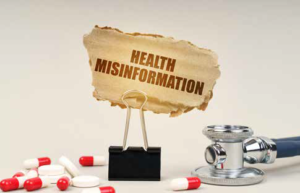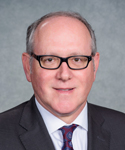 The Surgeon General has identified medical misinformation as a major public health threat, and many professional societies, including the American Medical Association, have called for action to combat it,” writes Richard J. Baron, MD, American Board of Internal Medicine (ABIM) chief executive officer, and Yul D. Ejnes, MD, ABIM’s board chair, in The New England Journal of Medicine (NEJM).1 In the article, “Physicians Spreading Misinformation on Social Media—Do Right and Wrong Answers Still Exist in Medicine?” the authors note that certifying boards are well suited to help address the problem of false information on social media.
The Surgeon General has identified medical misinformation as a major public health threat, and many professional societies, including the American Medical Association, have called for action to combat it,” writes Richard J. Baron, MD, American Board of Internal Medicine (ABIM) chief executive officer, and Yul D. Ejnes, MD, ABIM’s board chair, in The New England Journal of Medicine (NEJM).1 In the article, “Physicians Spreading Misinformation on Social Media—Do Right and Wrong Answers Still Exist in Medicine?” the authors note that certifying boards are well suited to help address the problem of false information on social media.
Assassination of the Trusted Voice
Medical misinformation is a societal problem and one that is affecting rheumatologists. The COVID-19 pandemic has amplified the problem, but it existed before COVID-19. The big deal here is the assassination of the trusted voice: People who folks used to trust are no longer the people they trust, and the public is obtaining their information from less reliable sources, often inaccurate sources, such as social media.2 This has created a challenge in the delivery of good medical care.
As rheumatologists, we are uniquely placed to help because we have longstanding, trusting relationships with our patients. In Alabama, where the vaccination rate for COVID-19 is lower than in many other parts of the country, when I advise my patients—who I have been taking care of for many years—that they should get vaccinated, even some of the patients who are vaccine resistant will often strongly consider getting vaccinated. That is but one example of how I think we have sway with our patients, as well as the public at large.
An outspoken, small minority of doctors has been espousing flagrant misinformation. Thankfully, we are not aware of any rheumatologists in this category, but we at the ACR are very concerned about this issue—one the ABIM has embraced as a priority area.
As specialists, we have a pretty good idea of what we know. We are constantly reevaluating to ensure we are “getting it right” as well as we can, but we generally know when things just are not true. An example of medical misinformation is given in the NEJM article: “Vaccines don’t prevent COVID deaths or hospitalizations.” This statement is flagrantly untrue. We try our best to rise to the highest level of evidence that we have, and we must be united with our colleagues in organized medicine to find ways to point out blatant lies coming from physicians.
Evidence-Based Medicine
As Baron and Ejnes write, becoming certified by the ABIM or one of 21 subspecialties requires passing an examination. Physicians must pass exams throughout their career to maintain this certification, which helps ensure they are practicing evidence-based medicine supported by the latest, peer-reviewed research, with the goal of protecting patient well-being and safety. During the COVID-19 pandemic, aside from the vaccine scenario, hydroxychloroquine, which many of our patients rely on to manage their systemic lupus erythematosus and other rheumatic diseases, was in short supply. People were using hydroxychloroquine to treat COVID-19 despite a strong preponderance of evidence suggesting the drug did not have a benefit.
Let’s help avoid the perceived regression to a post-truth era in which people think, ‘I believe; therefore, I am right.’
Some issues can be more questionable when there is a disagreement about the interpretation of the facts. Those are not circumstances for which any of the oversight boards have a concern. We may agree to disagree, particularly as rheumatologists, when many elements are, in fact, uncertain; we are used to that in a specialty in which many things are incompletely understood about our diseases and our drugs. We understand that people may see things in different ways.
What we are really trying to avoid, particularly in rheumatology, is having people going back to snake oil. Let’s help avoid the perceived regression to a post-truth era in which people think, “I believe; therefore, I am right.” That’s antithetical to science. As the late Sen. Daniel Patrick Moynihan once said, “You are entitled to your opinion, but you are not entitled to your own facts.”
Climbing the Evidence Pyramid
A book by Adam Grant, Think Again, emphasizes that we want to avoid being preachers and politicians; we want to be scientists.3
We recognize that we are occasionally wrong. We often need to rethink things, and science is always questioning the evidence and recognizing that over time the evidence may change. This is reiterated by master clinician and rheumatologist Ron Anderson, MD, who notes, “Once you make a diagnosis, you stop thinking”; however, he admonishes: “Question your own diagnosis so that you never stop thinking, and remember that part of the differential diagnosis is that you are wrong.”4
To some degree, the facts can get modified as new evidence becomes available. We go as high in the evidence pyramid as we can, trying to promulgate what the science is successively showing us. This is the way most rheumatologists roll; we are uniquely poised to promulgate this approach in our patient care and in communicating how to understand scientific evidence to the general public.
The Last Word
As a specialty society, we need to recognize that the geopolitical issues that affect us in a broad, societal way, such as medical misinformation and the related topic of fake news, are topics we must tackle. While a little outside our historic charge, the ACR is increasingly being asked to take appropriate stands on many social issues because they do affect the health of our patients. Perhaps the issue of our time is medical misinformation.

Dr. Saag
Kenneth G. Saag, MD, MSc, is a professor of medicine, holds the Anna Lois Water endowed chair and directs the Division of Clinical Immunology and Rheumatology in the Department of Medicine at the University of Alabama at Birmingham (UAB). He is the director of the UAB Comprehensive Arthritis, Musculoskeletal, Bone, and Autoimmunity Center. He is also the ACR’s 85th president.
References
- Baron RJ, Ejnes YD. Physicians spreading misinformation on social media—do right and wrong answers still exist in medicine? N Engl J Med. 2022 May 18. Online ahead of print.
- Saag M. Wonder of wonders, miracle of miracles: The unprecedented speed of COVID-19 science. Physiol Rev. 2022 Jul 1;102(3):1569–1577. doi: 10.1152/physrev.00010.2022. Epub 2022 Apr 21.
- Grant A. Think Again: The Power of Knowing What You Don’t Know. New York: Viking Penguin. 2021. https://adamgrant.net/book/think-again
- Tedeschi S. Unexpected closure. N Engl J Med. 2022 Jun 23;386(25):2359–2361.Epub 2022 Jun 18.
